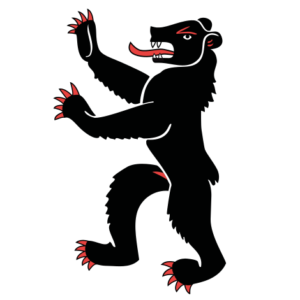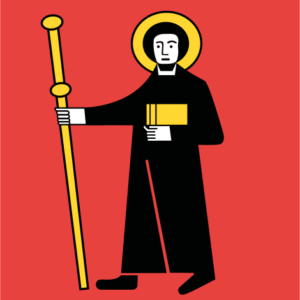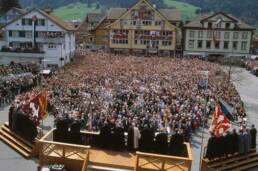Athenian democracy? Revive between Glarus and Appenzell…
In two Swiss cantons, the Landsgemeinde, a popular assembly in which citizens vote on the government, courts, laws and expenses by… a show of hands, is still in existence
Gianfranco Miglio, the great theorist of Italian federalism to whose political model contributed giants of German thought such as Carl Schmitt and Max Weber, had a great sympathy for a form of government that is resistant in the world only in Switzerland, in two remote rural cantons nestled in the Alps: the Landsgemeinde.
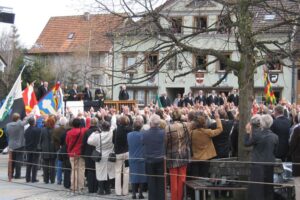
In the open-air popular assembly, a primitive form of direct democracy active today only in Glarus and Appenzell Innerrhoden, the professor from Como in fact found the background noise of the ancient form of government open to all that was proper to Athens.
The first surviving Landsgemeinde took place in 1294, three years after the creation of the “federation of the Helvetians” between the counties of Schwyz, Uri and Unterwalden: it was the oath of the Grütli…
A slice of Greek culture on top of the Alps
Adopted by other cities as well, that idea born in Greece provided that a limited number of citizens, strictly adults and male, from 30,000 to 50,000 people out of a population a little less than ten times larger, could propose bills and vote initiatives of an executive body, selected by the people, and no longer embodied by a series of archons or high magistrates and the Areopagus, the latter of noble extraction.
The word “democracy” (in Greek: δημοκρατία) combines the elements of “Demos” (δῆμος, “people”) is “Kratos” (κράτος, “power”) and is attested by Herodotus, whose works are dated between 440 and 430 BC, or 1,700 years before the birth of modern Switzerland, which is responsible for preserving it in pure form.
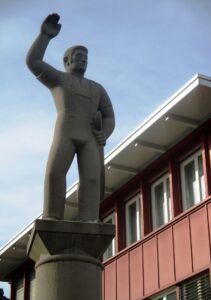
The Athenian institutional system, not very different from Glarus and Appenzell, hinged on three pillars: the assembly or Ecclesia, composed of all citizens with the right to vote, the Council of 500 or Bulè and, finally, the courts, whose magistrates were drawn by lot among the inhabitants of Athens over thirty years old.
Voting always between late April and early May
The Landsgemeinde (solemn open-air popular and political assembly) takes place on the last Sunday in April (Appenzell Innerrhoden) and the first Sunday in May (Glarus): on a given day, the eligible voters gather in the open air to choose the government and the courts and to decide on cantonal laws and expenditures.
In the states of Glarus and Appenzell Innerrhoden, which have a population of 40,000 and 16,000 respectively, direct democracy is thus based on the cliché of the Greek polis, which can only be implemented in smaller areas. Once a year, around 1,000 voting citizens gather in the two cantons for the Landsgemeinde, an assembly of the people which takes decisions on the election of cantonal authorities and deliberates on matters of particular or general interest.
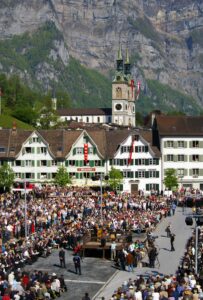
The last canton to renounce the system was Obwald in 1998. The system is much criticized: because it does not guarantee access to voting to all, for example to the sick, to prisoners and to all those who cannot physically go to the square, for the lack of secrecy of the vote and because the count is often done in spans, although normally a couple of hours are enough to settle all questions and the Landsgemeinde is in the heart of the local people.
A rite officiated by the ancient Landamen
Leading the way are the members of the government and the cantonal court of justice in their cloaks, accompanied by the guests of honor and the bishops with their colorful flags. They, together with the voters, enter the voting precinct and stand on the tribune called “Stuhl”.
When the last bell rings, the incumbent Landammann (the president of the cantonal government) declares the session open and begins the discussion of the issues submitted in writing by any voter in the canton.
At the shout of the Landamann in the designated Landsgemeindeplatz, “ds Wort isch frii” in Glarus and “s Woot ischt frei” in Appenzell, the vote is taken as per tradition, sometimes raising a sword, the Dagen, which is often handed down from generation to generation. Curiously, the offices retain their pompous old names.
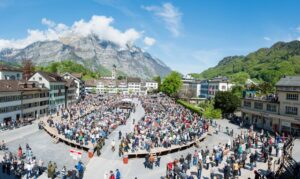
Thus the president of the government is the Landamann; the Statthalter is responsible for the departments of health and social security, the Säckelmeister is the Minister of Finance, the Landeshauptmann is in charge of land and forests, the Bauherr takes care of the environment and construction and the Landesfähnrich manages security, police and military matters.
The people were legally referred to in Latin documents by the words fideles, universi homines or universitas, while in German the Landsgemeinde was described for the first time in 1275 as Gemeinde der Leute des Tals (“community of the people of the valley”); in Schwyz the same type of assembly was called Landtag.
When the government of the people is multi-level
Historians have also used the term to refer to the assemblies of valley communities or other regional entities that did not achieve political autonomy. There is no shortage of heated debates open to anyone: deliberation is by a show of hands and it is estimated whether more or less than half of the votes have been reached. In cases of doubt, it is obligatory to proceed with an actual count.
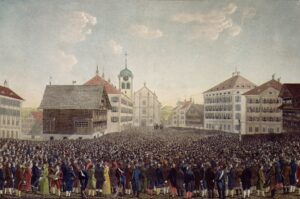
In the past, Landsgemeinde were also held in other cantons and were a typical phenomenon of the late Middle Ages: Uri (since 1231), Schwyz (since 1294), Unterwalden (since 1309), not yet divided into Obwalden and Nidwalden, Zug (since 1376), Appenzell (since 1378), before the division into Inner and Outer, depending on the religion, Protestant or Catholic, Glarus (since 1387) and also several other territories and valleys dependent on one or more cantons in the form of the bailiwick, including Bellinzona and Riviera in Ticino and Einsiedeln. From about 1500 the term Landsgemeinde was commonly used to designate the supreme authority of the rural cantons.
In the subject or allied countries and in the valleys, other names such as Talgemeinde (Urseren Valley, Hasli Valley, Upper Simmental), Landsgemeinde (Toggenburg), Teding (Engelberg), Parliament (Leventina), Cumin, Tschendada, Landsgemeinde or Bsatzig (jurisdictional communities and large municipalities of Graubünden) and Zendgemeinden (Decanie of Valais) were also common.
If it is all Swiss the defense of the myth of Pericles
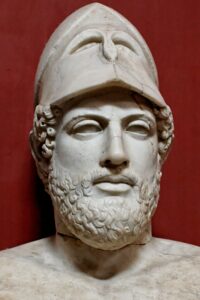
“Our political system does not set out to imitate the laws of other peoples: we do not copy anyone, rather it is we who are a model for others. It is called democracy, since in administering it qualifies not with respect to the few, but to the majority.”
And so the speech of Pericles, as reported by Thucydides, finds in north-eastern Switzerland, where the Confederation extends its hand to Germany, Austria and Liechtenstein, its most ancient, pure and perfect declination.
Schwyz and Glarus, lost half-cantons of Swiss history
